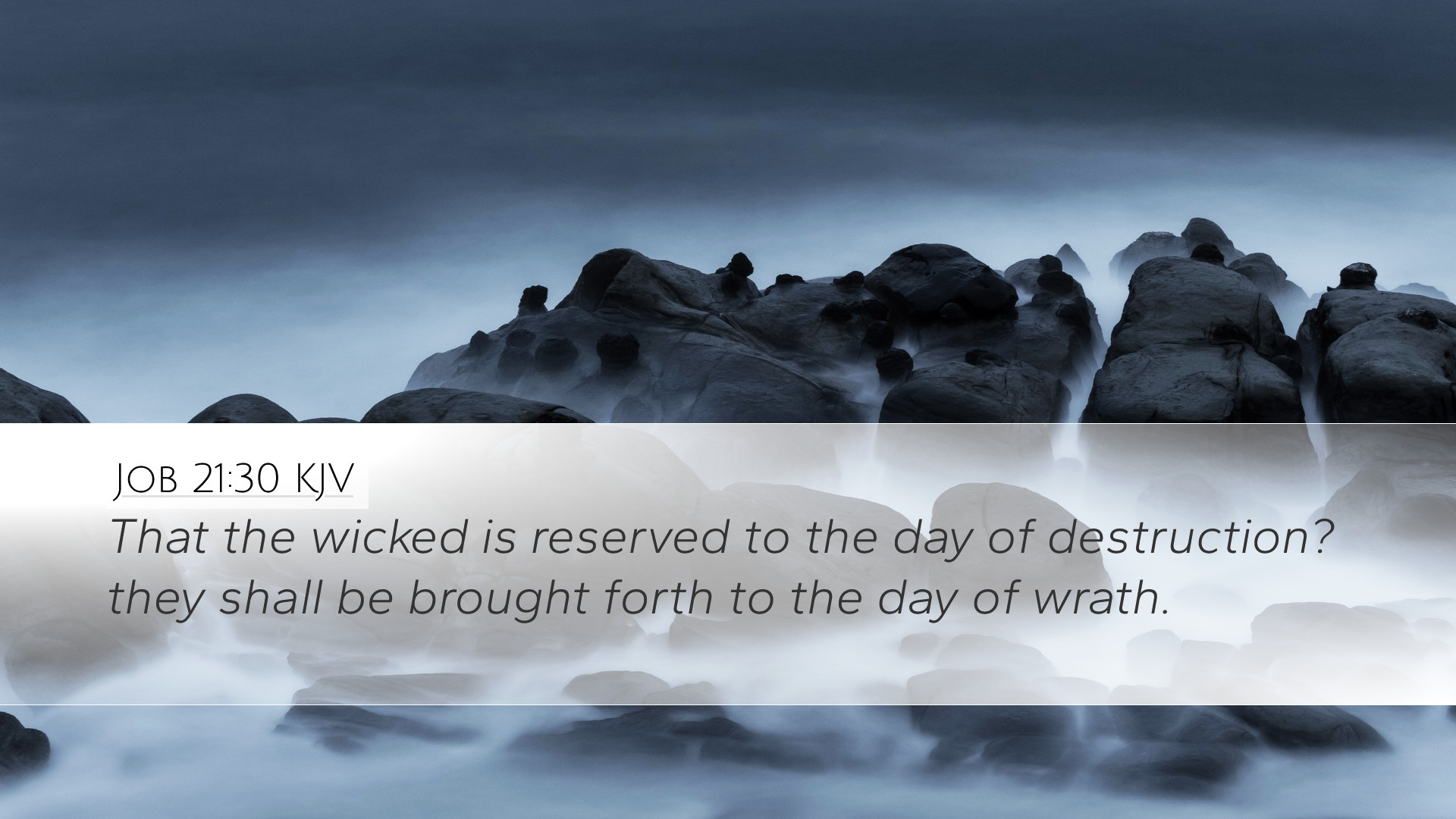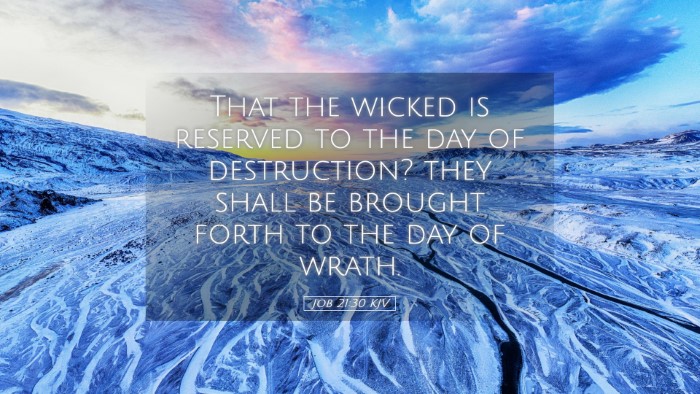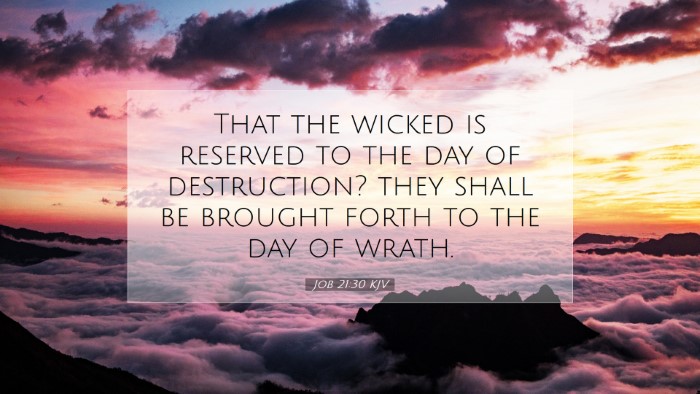Commentary on Job 21:30
Job 21:30 reads: "That the wicked is reserved to the day of destruction? They shall be brought forth to the day of wrath."
Introduction
This passage reflects the profound questions of suffering and justice in the world, particularly concerning the fate of the wicked. Job, amid his own trials, challenges the prevailing notion of immediate divine retribution, emphasizing that the wicked often prosper while the righteous suffer. This commentary draws insights from various public domain sources to explore the significance of this verse.
Contextual Background
Job finds himself in a dialogue with his friends who assert that suffering is a direct result of personal sin. In Job 21, he articulates a counterargument, demonstrating that the wicked frequently escape visible punishment in this life. This chapter acts as a cornerstone of Job's defense, illustrating the tension between earthly circumstances and divine justice.
Matthew Henry's Insights
According to Matthew Henry, this verse encapsulates Job's assertion that the wicked are not immediately punished; instead, they are "reserved" for a later day of wrath. This notion of being "reserved" highlights God's patience and the ultimate judgment that awaits those who defy His commandments. Henry emphasizes that earthly prosperity does not guarantee divine favor, and thus, the fates of the wicked and the righteous cannot be hastily judged based on temporal successes.
Key Themes from Matthew Henry
- Divine Patience: God's delay in judgment reflects His long-suffering nature, giving sinners time to repent.
- True Justice: The final day of reckoning will reveal God's righteous judgment, contrasting immediate appearances.
- Wickedness and Prosperity: Job highlights the dissonance between the prosperity of the wicked and the suffering of the righteous.
Albert Barnes' Commentary
Albert Barnes expands on this verse by suggesting that Job acknowledges a universal truth: the wicked often flourish in this life, appearing to escape the trials that befall the righteous. Barnes points out that the "day of destruction" refers to a future time when justice will be fully realized. The emphasis here is on the certainty of divine justice, which may not be visible in the present but is assured in the divine economy.
Important Observations from Albert Barnes
- Future Retribution: Barnes reinforces that the ultimate judgment will come, where the distinctions between the righteous and the wicked will be clear.
- Apparent Injustice: Job’s lament addresses the observable inequalities in life, pushing readers to reflect on the nature of God's justice.
- Hope for the Righteous: Though the wicked prosper temporarily, there is hope for the righteous that their suffering is not in vain.
Adam Clarke's Perspective
Adam Clarke provides an in-depth theological interpretation, suggesting that Job's argument serves as both a defense of his integrity and a broader commentary on the nature of evil and suffering. Clarke emphasizes that the phrase "reserved to the day of destruction" implies God's sovereign control over the fate of individuals, ensuring that no act of wickedness goes unnoticed or unaccounted for.
Insights from Adam Clarke
- Sovereignty of God: Clarke argues for the assurance that God's sovereignty governs both the temporal and the eternal, guaranteeing justice.
- Moral Order: The existence of a moral order that ensures that wicked actions ultimately lead to spiritual and eternal consequences.
- Encouragement for Believers: The faithful are reminded that their present sufferings do not reflect God's abandonment but rather serve a higher purpose.
Theological Implications
This verse offers rich theological insights that resonate with core doctrines of Christianity, including the ideas of divine sovereignty, justice, and eschatology.
Justice of God
The justice of God is not always evident in the temporal realm. Job’s assertions challenge easy answers to suffering and wrongdoing, compelling theologians to delve deeper into the character of God, who allows the existence of evil while promising ultimate justice. This theological tension invites believers to seek understanding in the face of adversity.
Suffering and Redemption
Job’s lamentations reflect a broader biblical theme where suffering is often a precursor to redemption. The emphasis on the “day of wrath” encourages the faithful to hold fast in their trials with the hope of divine vindication, reminding believers that suffering is not wasted in God's redemptive plan.
Applications for Pastors and Theologians
For pastors and theologians, this passage serves as a critical reference when addressing the complexities of suffering and justice within their communities.
Pastoral Challenges
Engaging with congregants grappling with unjust suffering requires sensitivity and a deep understanding of Job’s experiences. Pastors can draw from this text to guide discussions on the nature of God’s justice and the temporary state of the wicked’s prosperity.
Theological Reflection
Theologically, this verse challenges scholars to reconcile the tension between God’s justice and the presence of evil. This understanding cultivates a more robust theology that upholds divine sovereignty while acknowledging human suffering, leading to deeper insights into the nature of God’s character.
Conclusion
Job 21:30 profoundly challenges the reader’s understanding of justice, prosperity, and suffering. Insights from Matthew Henry, Albert Barnes, and Adam Clarke remind us of the ultimate hope in divine justice and the importance of viewing earthly circumstances within the larger narrative of God’s redemptive work. As both pastors and scholars reflect on this passage, they are urged to embrace the complexities of faith, encouraging believers to trust in God’s timing and justice.


